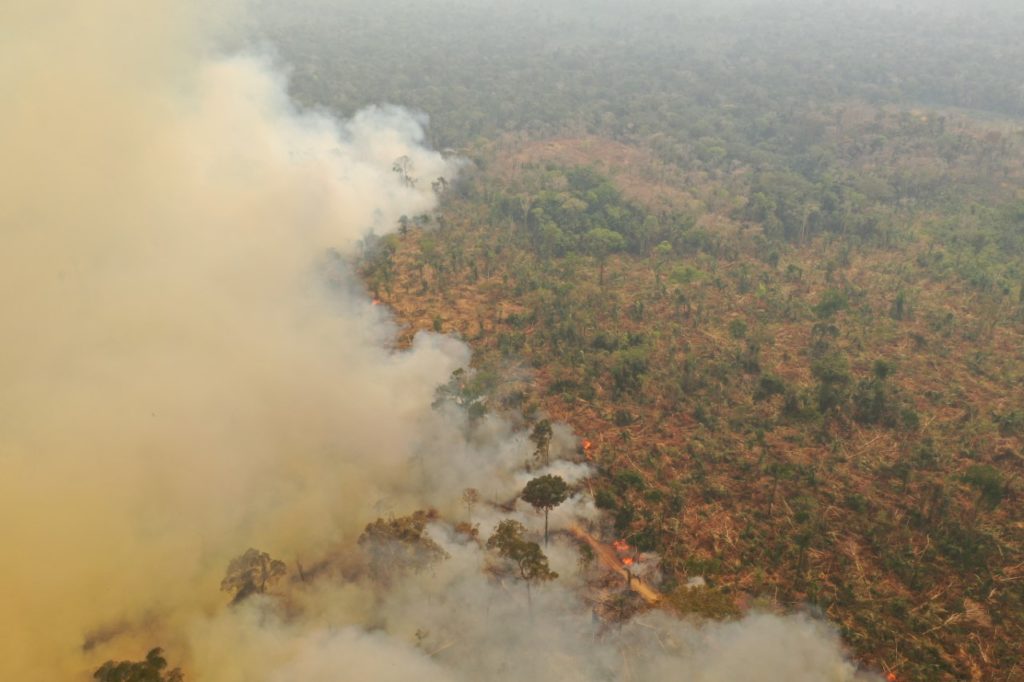A new report by WWF on forests and wildfires show that global fire alerts as of April 2020 are already up 13% compared to 2019 - which was a record year for fires. These wildfires are driven by climate change but also by deforestation caused primarily by land conversion for agriculture.
Deforestation has been steadily rising especially in the Brazilian Amazon, with fire alerts from August 2019 to July 2020 33% higher than in the same period in the previous year. The latest data according to the new report shows that fires in the Brazilian Amazon this year are more than 52% higher than the 10-year average.
Forest loss in the first six months of the year totalled 307,000 hectares, 26% more than the same period in 2019. In July, 6,803 outbreaks of fires were detected in the Amazon, 28% more than the same period in 2019
Greenpeace warned in May that the Brazilian government’s policies combined with global trade in timber would have “devastating consequences” for the Amazon’s indigenous rainforest. And in 2019, scientists warned that Amazon is approaching the point where it will tip over to a totally different ecosystem with would affect the climate of the planet enormously.
According to the new report, issued last week by the World Wide Fund for Nature (WWF), equal attention should be paid to countries like Canada, the US, Australia and Russia. For the last 20 years, these have all seen an increase in the average annual area burnt, with repeated fires leaving little to no time for recovery in between.
Some countries are seeing patterns changing with frightening speed – extreme events this year in Russia already suggest its wildfires could be 10 times worse than in 2019. It is estimated that humans are responsible for around 75% of all wildfires and much of the increase in fire incidents during 2020 can be directly linked to human actions.
If trends continue, there will be devastating long-term consequences from the release of millions of extra tonnes of CO2. This is on top of the destruction of vital ecosystems, and the threat to human lives and livelihoods
In tropical and subtropical regions, forest fires are mostly intentionally set for land-use change, clearing and preparing new areas for cultivation. In the case of Brazil, COVID-19 appears to have helped the regime’s stated intention to open the Amazon for business. The environment minister was recorded telling colleagues to “take advantage of the fact that the attention of the press is on the pandemic to approve infra-legal reforms of deregulation of the environment”.
“The EU needs to face up to its share of the responsibility for the Amazon fires and deforestation across the globe,” Anke Schulmeister-Oldenhove, Senior Forest Policy Officer at WWF EU, commented.
“We import products like soy and beef from Brazil. Agriculture expansion for such products is currently fuelling deforestation and fires in the Amazon but also the destruction of other pristine nature like the Cerrado (a tropical savanna region). EU consumers need to be sure that the products they buy are not linked to deforestation and forest fires.”
“We need a new, strong EU law to achieve this,” she added and referred to an EU proposal for a new law on deforestation.
A Commission official told The Brussels Times (1 September) that the Commission expects shortly to launch a public consultation on the new law. It will cover all commodities that may be linked to deforestation, imported and domestic, including soy and beef. An inception impact assessment was published in February 2020.
An earlier EU study showed that the EU is responsible for 10 % global forest destruction through its consumption of commodities like meat, dairy, soy for animal feed, palm oil, coffee and cacao.
The EU is the world’s second-largest market for "forest-risk commodities", such as soy and beef, after China. While the EU imports less soy than China, its soy imports carry a greater risk of being linked to deforestation, according to WWF. This is because the EU’s imports are more often sourced from deforestation frontiers in the Amazon and Cerrado.
M. Apelblat
The Brussels Times

